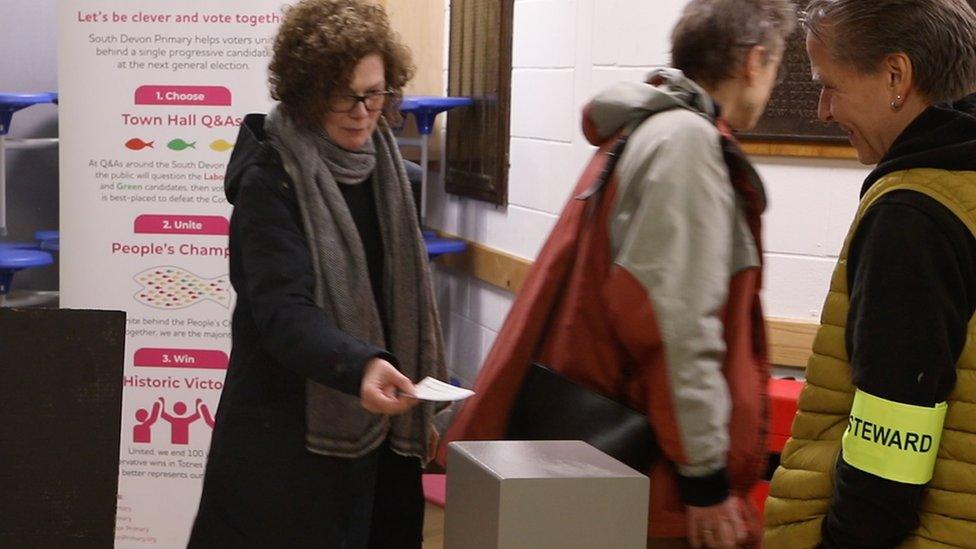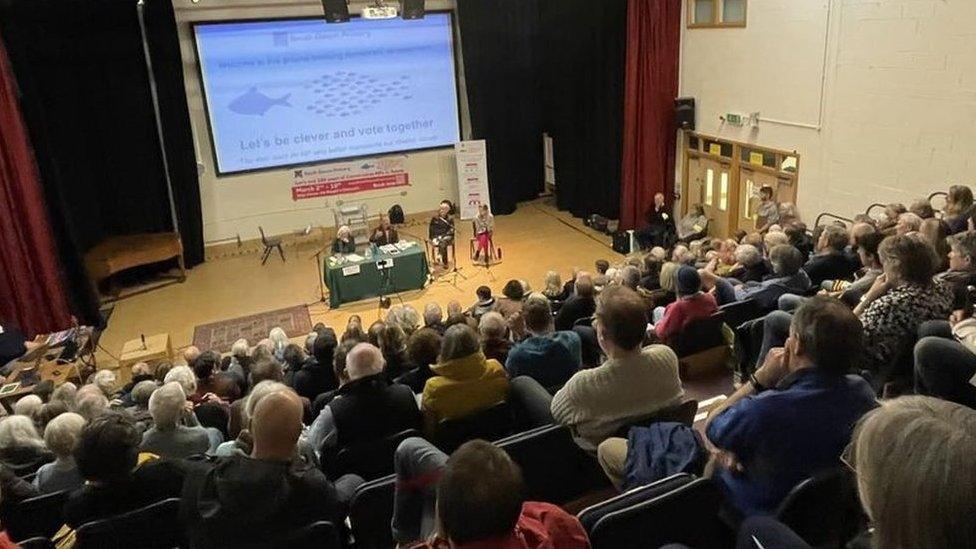Local group chooses candidate to take on Totnes Tory MP
- Published

In all 1,072 people participated in the process
A group campaigning to unseat the Conservatives in South Devon at the next general election have chosen a Liberal Democrat candidate they are calling "the People's Champion" to represent them.
Caroline Voaden won the selection with 78.4% of the votes cast - a total of 840 votes.
The Green candidate won 19.6% share, with 210 votes, while - despite refusing to take part - the Labour Party got 22 votes. The party are yet to select a parliamentary candidate for South Devon.
The meetings were organised by a campaign group called the South Devon Primary.
The area's current Tory MP Anthony Mangnall, who was not invited to take part in the events, called the process a "Lib Dem, Green stitch-up".
Mr Mangnall was elected to Parliament for Totnes in 2019 with over 53% of the vote. This was the third general election in a row which saw the Conservative vote share in the constituency exceed 50%.
Further boundary changes will see Totnes form the bulk of a new South Devon constituency at the next election.
The group's intention is to unite non-Conservative, "progressive" voters, who are generally understood to be on the left of the political spectrum, behind one single candidate after a series of hustings and a vote.
But although the group aimed to have candidates from the Labour Party, the Lib Dems and the Green Party in attendance, Labour refused to take part.
Despite this, all three parties remained on the ballot papers given to audiences at each meeting.
"This seat has been won by the Conservatives for 100 years", Simon Oldridge, co-founder of the South Devon Primary, told the BBC.
Mr Oldridge claims that the Tories could win South Devon at the next election with "less than a third of the vote", the other votes "divided" between Labour, the Lib Dems and the Green Party.

The South Devon Primary was created, says Mr Oldridge, "as a way of uniting that progressive vote behind one opposition candidate".
The last non-Tory to win the seat was Liberal MP Henry Vivian in 1923, albeit under old constituency boundaries.
In spite of the efforts of the group, Tory MP Mr Mangnall isn't worried by the threat from this new organisation.
"I'm not nervous and nor am I complacent, I'm just determined with getting on with the job at hand and doing the best I can," he says.
A Labour spokesperson says: "Labour has a plan to get Britain's future back and with the support of the British people we're fighting to win a majority at the next election so there's no need to be talking about collations or pacts."
Ms Voaden says: "It's clear that the Liberal Democrats are the challengers to the Conservatives here in South Devon, and that I'm the only candidate who can beat the Conservatives at the next election."
"It's a really adult way of doing politics," says Robert Bagnall, the Green candidate.
"It's not about anybody standing down, or even reducing their campaigning. The prize on offer is the army of advocates and canvassers and door-knockers that the South Devon Primary will produce and getting that army out behind a particular candidate."
"Anything's possible, but I suspect that the likelihood of success is pretty small," says Tim Bale, Professor of Politics at Queen Mary University of London.
Prof Bale thinks that if Labour, the Liberal Democrats and the Green Party all stand candidates in South Devon at a general election it would "spoil any chances" of a "progressive majority".
It's expected that all three parties will be on the ballot in the new seat along with the Conservative Party and Reform UK candidates.
Prof Bale references the 1997 election as an example of successful anti-Tory tactical voting in a general election, but says it worked in-part due to a "so-called pact" between previous party leaders.
He says if voters in South Devon want to work out who may have the "best chance of beating the Conservatives" they should "check the results last time around" and take in the latest local polling.
"I can't rule out the possibility that a Lib Dem, Green or a Labour candidate might win," he added, "but I don't think if that were to occur it would be the result of this new initiative."
What's next?
The organisers behind this are looking to export their idea to other areas.
Active groups are already up-and-running in several other constituencies, run by local volunteers.
These areas include the seats of prominent cabinet ministers including Business Secretary Kemi Badenoch and Science Secretary Michelle Donelan.
Local organisers are also active in Chancellor Jeremy Hunt's constituency in Surrey, as some polls suggest Mr Hunt is under threat of losing his seat at the next election.